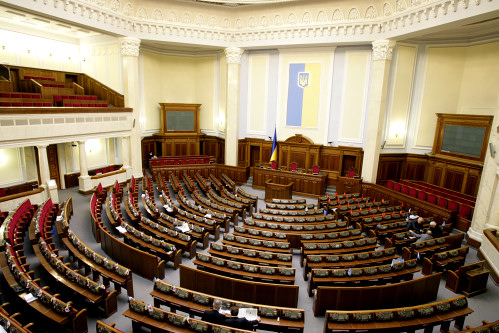
Committee of voters of Ukraine conducted a research of Coalition agreement implementation for the 1st quarter of 2015 (January, February and March).
Analysis was based on draft laws submitted to the Verkhovna Rada of Ukraine of VIII convocation, laws passed during this period and regulatory acts of the Cabinet of Ministers of Ukraine. 99 draft laws of the Verkhovna Rada of Ukraine (13 of which were initiated by the Cabinet of Ministers of Ukraine) aimed at implementing 55 provisions of the Coalition agreement provided for the first quarter of 2015 were analyzed in the course of research. Only regulations of CMU aimed at implementation of the provisions of the Coalition Agreement for the 1st quarter were considered.
The level of implementation of each provision of the Coalition Agreement was estimated as “implemented”, “not implemented”, “partially implemented” (if necessary laws of Verkhovna Rada of Ukraine and necessary regulations of the Cabinet of Ministers of Ukraine were adopted but actually provisions were not implemented), and “in process” (relevant draft laws are developed).
In developing research experts CVU distinguished 511 substantive provisions in the Coalition Agreement which are categorized in 17 sectors.
The timeframe of the research: November 27, 2014 March 24, 2015.
CONCLUSION №1
The coalition agreement initialled by five political parties (Petro Poroshenko bloc, VO “Batkivschyna”, “Narodny Front” (People’s Front), Radical Party of Oleh
Liashko and Samopomich Union) passed to Verkhovna Rada of Ukraine of VIII convocation involves implementation of 511 provisions categorized in 17 sectors.
Most provisions (84) are planned in the field of regulatory policy, business development and ensuring competition environment. The next sectors are decentralization and public administration reform (72) and social and humanitarian policy (47).
Least in number of provisions are applied to sectors of constitutional reform (3), accelerated economic development (6) and electoral law reform (8).
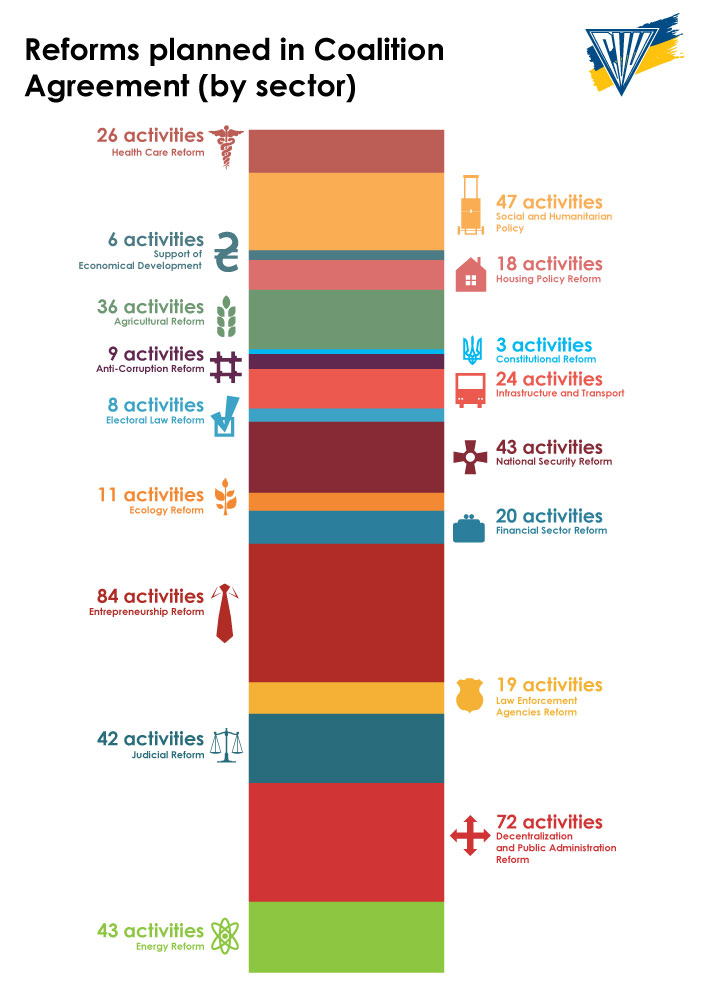
CONCLUSION №2
The Coalition Agreement doesn't have a unified approach to timing of provisions implementation. During the 1st quarter of 2015, 55 provisions are provided to be implemented; during the 2nd quarter of 2015 59; during the 3rd quarter of 2015 only 10 and during the 4th quarter of 2015 13; 47 more provisions are scheduled to be implemented separately during 2015.
Almost 28% (143 provisions) of the Coalition Agreement have no deadlines. There are no timeframe for 4 sectors: constitutional reform, financial sector reform, health care reform and the reform of environmental management and environmental policy integration in other sectoral policies.
All provisions have clear timeframes in the following sectors: authorities’ renewal and anticorruption reform, judicial reform, reform of the electoral law, accelerated economic development and socialhumanitarian reform.
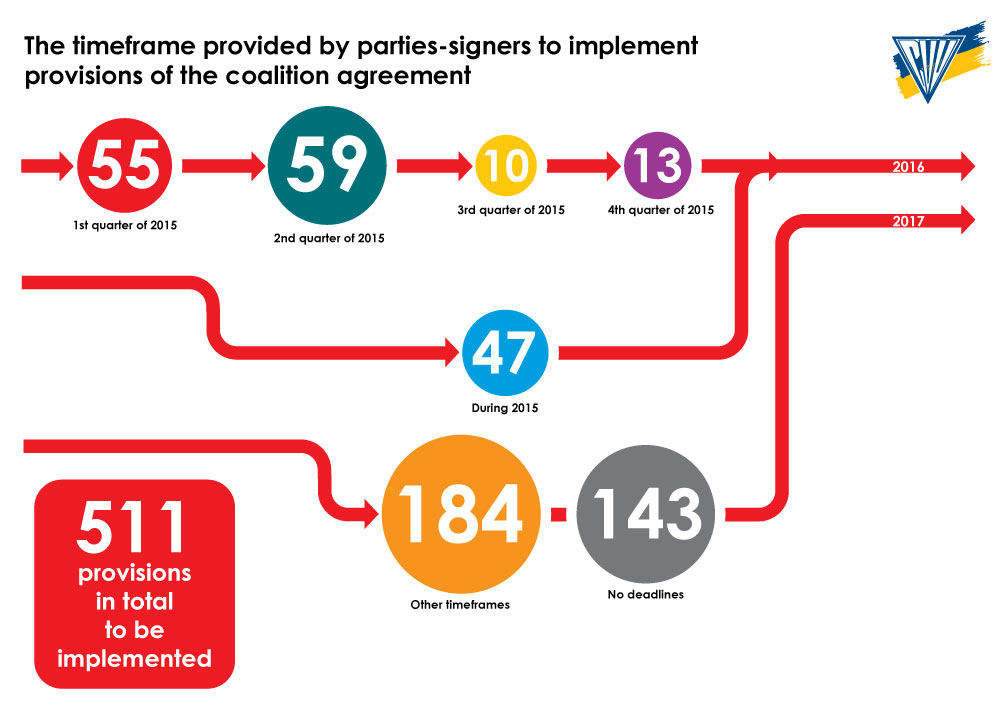
CONCLUSION №3
The Coalition Agreement provides to implement 55 provisions in 10 sectors during the 1st quarter of 2015. Most provisions are related to decentralization and public administration reform (18), national security and defence (10), and providing citizens with public services and housing policy reform (6).
Authorities’ renewal and anticorruption reform, agricultural reform, infrastructure and transport and energy reform and energy independence require implementation of 4 provisions in each field; 3 more provisions are related to electoral law reform.
One provision is scheduled in law enforcement and regulatory policy reform, and one more in field of business development and ensuring competition environment.
Most provisions for the 1st quarter of 2015 compared to the total number of provisions in sector, are to be implemented in the field of authorities renewal and anticorruption reform (4 out of 9) and electoral law reform (3 out of 8).
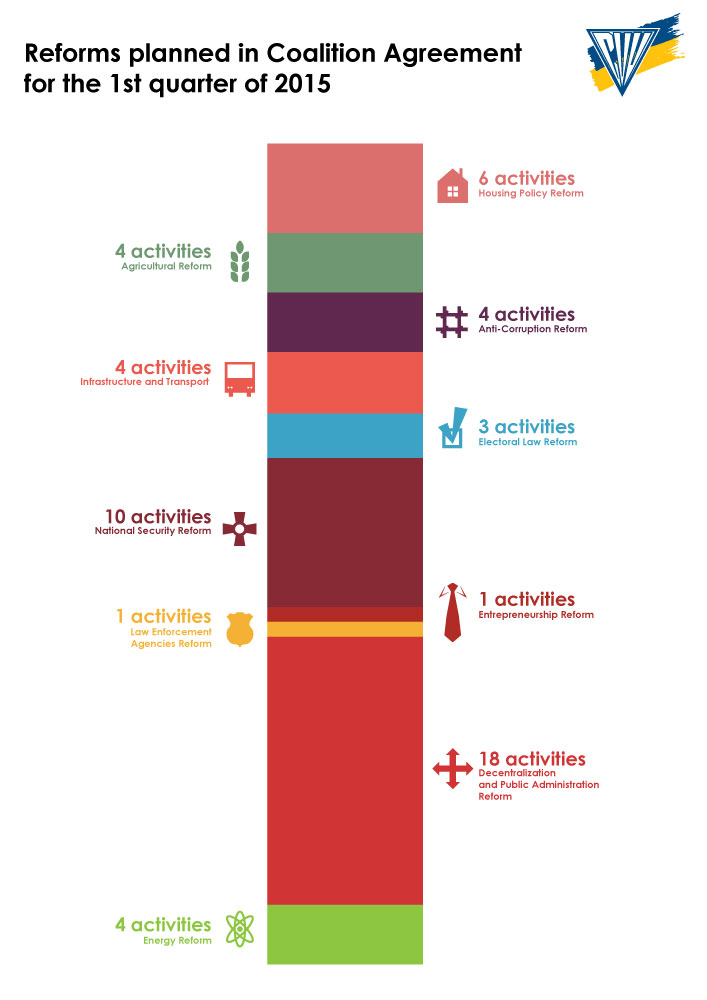
CONCLUSION №4
As of March 24, 2015 considering provisions of the Coalition Agreement to be implemented in the 1st quarter we can state that 8 provisions are implemented, 7 partially implemented, 19 are not implemented, and 21 are in process of implementation.
All the 8 implemented provisions belong to three sectors: decentralization and public administration reform (5), national security and defence reform (2), authorities’ renewal and anticorruption reform (1). The following provisions are partially implemented: 1 provision in agricultural development and regulatory policy, 1 provision in business development and ensuring competition environment, 2 provisions in field of national security and defence reform, and 3 positions in decentralization and public administration reform.
Despite the relatively low formal percentage of the Coalition Agreement implementation (14%) a significant number of the Coalition commitments is in the process of implementation (38%). Most of provisions in the process of implementation are devoted to housing policy reform (5) and energy reform (4). National security and defence, infrastructure and transport, agricultural development, authorities’ renewal and anticorruption policy have 2 provisions in process of implementation in each field. There are also 3 provisions in process in the field of decentralization and public administration reform, 1 more provision in process is in electoral law reform.
No provision is implemented in sectors: housing policy reform; energy reform; electoral law reform; infrastructure and transport, law enforcement reform.
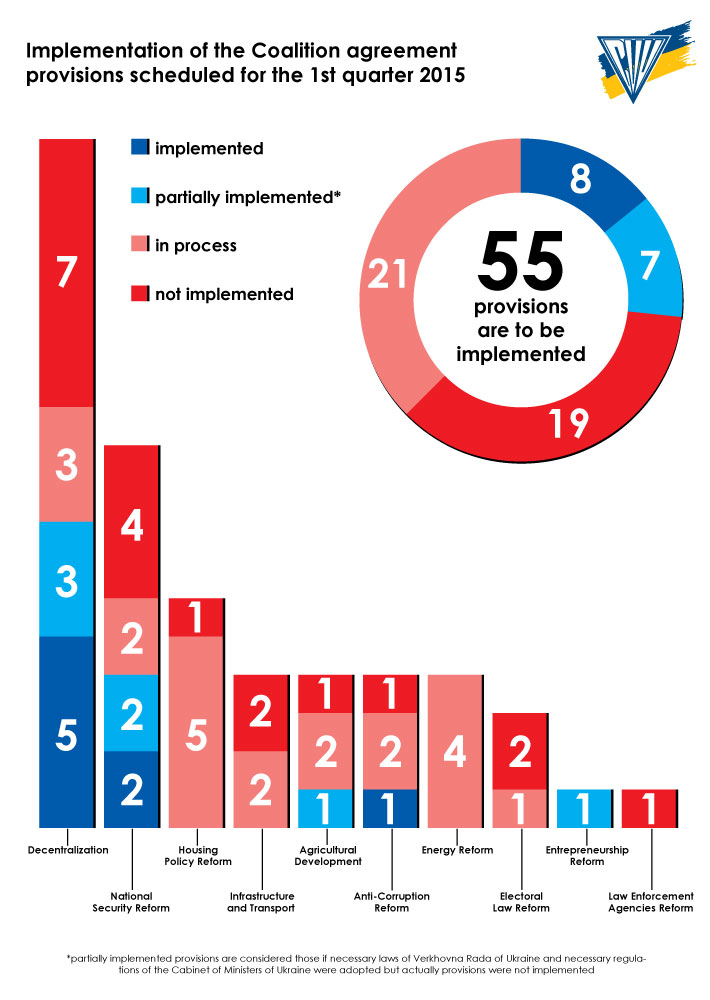
CONCLUSION №5
One of the reasons of low indicators of the Coalition Agreement implementation is unrealistic deadlines provided for some provisions. It is proven by the fact that timeframes of certain reforms prescribed in the Coalition agreement for the 1st quarter of 2015 do not correspond to the Plans of relevant ministries on their implementation.
For example, the Ministry of Agrarian Policy and Food (Ministry planned to develop the Concept of Rural
Development before June 1), the Ministry of Regional Development, Construction and Housing and Utility Services of Ukraine (regarding the legal framework for decisionmaking by the general meeting in apartment buildings, where the owners are not united in condominiums within six months after the adoption of the Law), the Ministry of Defence of Ukraine (regarding the withdrawal of State Special Transport Service from subordination to the Ministry of Infrastructure and inclusion of the Armed Forces in the 2nd quarter of 2015)
CONCLUSION №6
Among the partiessigners the greatest contribution in implementation of the Coalition Agreement during the 1st quarter of 2015 was made by MPs of faction Petro Poroshenko bloc: they participated in development of 72 draft laws (authors and coauthors of draft laws).
MPs of allUkrainian Union Batkivschyna and Narodny Front participated in development 35 and 30 draft laws respectively.
20 draft laws were developed with participation of Samopomich Union MPs and 10 draft laws with participation MPs of Radical Party of Oleh Liashko MPs.
CONCLUSION №7
As a whole 86 draft laws were developed by partiessigners to implement provisions of the Coalition Agreement for the 1st quarter. The Cabinet of Ministers of Ukraine initiated 13 draft laws and developed 6 own regulations to implement the Coalition Agreement.
NovemberDecember 2014 was the most productive legislative period for MPs (31 draft laws were registered to implement provisions of the 1st quarter of the Coalition Agreement). In January the figure was 20 draft laws, in February 22 draft laws and March (before March, 24) only 13 draft laws.
In general during November, 27 – March, 24 the Verkhovna Rada of Ukraine of VIII convocation has developed almost two times as many draft laws (2142) than the Verkhovna Rada of Ukraine of VII convocation (1160). Since November, 27 till December, 31 8 plenary meetings were held and 9 days were devoted to work in committees, commissions and factions, 3 more days MPs were involved in work with the voters. In January and February the number of plenary meetings decreased (3 meetings in January and 4 February), the number of days for work in committees, commissions and groups remained the same in January (9) and decreased in February (5), the number of days for work with voters increased (5 days). In March 5 plenary meetings, 9 days to work in committees, commissions and factions and 2 days to work with voters are scheduled.
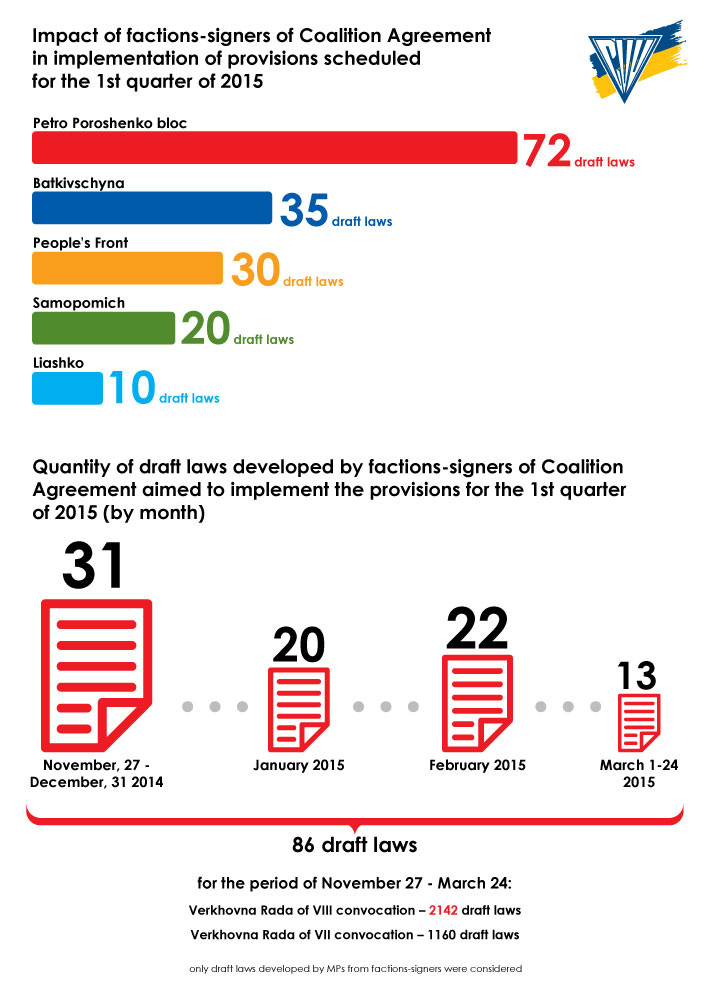
RECOMMENDATIONS
1. Committee of voters of Ukraine appeals to heads of factionssigners of the Coalition Agreement with a proposition to introduce quarterly reports for voters on implementation of the Coalition Agreement.
2. CVU appeals to heads of factionssigners of the Coalition Agreement with a proposition to revise the Coalition Agreement provision quarterly in terms of feasibility and to coordinate actions with other subjects of legislative initiative, whose work is aimed at implementation of the Coalition Agreement.
3. The Coalition General Meeting should amend the text of the Coalition Agreement in case if certain provisions are not implemented in time, stipulated in the Agreement.
In particular, it is necessary to establish clear timeframe for those provisions of the Coalition Agreement, which do not deadlines in the current version. Proper legal wording of all provisions of the Coalition Agreement should be ensured.
New provisions concerning important issues which become particularly urgent during recent months should be introduced in the Coalition Agreement. It is, in particular, creation of legal framework for elimination of corporate conflicts and illegal seizure of companies.
In addition, a number of legislative acts on civil protection, construction of shelters, protective fortifications etc. should be adopted.
4. Implementation of the Coalition Agreement provisions on the constitutional and electoral reforms should be enforced as urgent in view of upcoming beginning of election campaign on local elections in 2015 and as legal framework for other reforms.
5. Number of plenary meetings and working days in committees, commissions and factions should be increased by reducing the time allocated to work with voters to improve the effectiveness of the Verkhovna Rada of Ukraine.
6. Public presentation and expert discussion of all legislation provided the by Coalition Agreement should be launched.
7. The Chairman of the Verkhovna Rada of Ukraine should make a decision on live broadcast of parliamentary committees at the official website of the Verkhovna Rada of Ukraine, to increase the intensity of legislative work.

